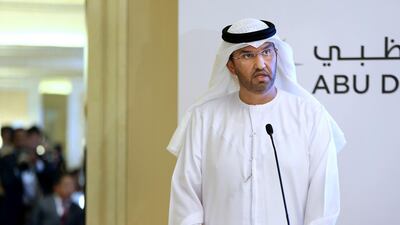Abu Dhabi Ports has partnered with China’s largest shipping company to more than double the container-handling capacity at Khalifa Port over the next several years.
The deal ties in with Abu Dhabi Ports’ plan, announced last month, to expand the quay wall and dredge the harbour to add an additional 2 metres of depth to allow the world’s biggest ships to dock. The move is part of Abu Dhabi’s broader strategy to develop the port as a regional hub and link it with industrial free zones to expand and diversify the economy.
“The 35-year concession agreement [with Cosco Shipping] is a unique opportunity to expand trade between China and the UAE and strengthen trade in the UAE and other Gulf countries,” said Sultan Al Jaber, the Minister of State and the chairman of Abu Dhabi Ports.
“Abu Dhabi Ports sees the deal as greatly enhancing Abu Dhabi’s role as a key logistics trading hub between East and West and in diversifying the UAE economy,” said Mr Al Jaber, who is also head of Abu Dhabi National Oil Company (Adnoc).
Khalifa Port currently processes 2.5 million containers annually and it has set a goal to raise annual capacity to 15 million containers by 2030.
Under the terms of the deal, Cosco has committed to building out the container infrastructure and to operate, initially, 1,200 metres of quay and yard with a capacity to process annually an additional 2.4 million standard-sized containers.
Abu Dhabi Ports’ chief executive, Mohamed Juma Al Shamisi, said Cosco Shipping is expected to start operations on the first 800 metres of quay in the first half of 2018, with the other 400 metres coming onstream in 2020. In a filing, the company said the Abu Dhabi investment would total US$738 million.
The timing will depend on the expansion project hitting deadline and there are 250 workers already working on the first 1,000 metres of quay wall expansion, which will add 600,000 square metres of space for cargo handling.
Cosco Shipping also has an option to take an additional 600 metres of quay space, increasing the capacity by a further 1.1 million containers, taking total annual capacity to 3.5 million containers.
“The Gulf is representing a couple hundred million [annual containers] volume but there is only one regional hub at the moment and that is Jebel Ali and it has congestion problems, so I think the timing is right,” said Wan Min, the Cosco Shipping president, who signed the deal. “Our goal is to grow Abu Dhabi into another regional hub.”
In spring Cosco formed the Ocean Alliance with three other shippers – CMA CGM, Evergeen Line and OOCL – which from next April will offer a range of services from their combined fleet of 350 ships, and Mr Wan said he sees Abu Dhabi as a key regional link in that strategy.
The Ocean Alliance was a response, in turn, to a similar alliance between the world’s two largest container shippers, Maersk Line and Mediterranean Shipping, known as the 2M Alliance, which is part of a broader consolidation in world shipping as trade moves more to container-based from bulk. The Abu Dhabi expansion is also designed to allow docking of the world’s largest class of container ships, which can hold as many as 14,000 units.
“We expect that the introduction of Cosco will be a catalyst for investment by foreign companies to set up in the free zone,” said Mr Al Shamisi, referring to the adjacent Khalifa Industrial Zone Abu Dhabi, Kizad, the 417 sq kilometre industrial zone about 70km north of Abu Dhabi city.
The overall ports and free zone project is scheduled for completion in 2030 and the target is for the free zone to contribute up to 15 per cent of Abu Dhabi’s non-oil GDP and meet diversification goals.
The port handles a wide range of goods, from cars to processed foods to chemicals and building goods, with most of the volume transshipment on its way to other GCC countries or further afield.
amcauley@thenational.ae
Follow The National's Business section on Twitter

